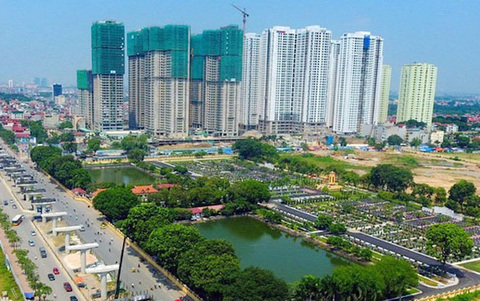 |
Vietnam is one of the global property hotspots in 2019, Mr. Matthew Powell, Director of Savills Hanoi, told a conference in the capital on May 15.
“With robust fundamentals, a positive macroeconomic outlook, and continuous investment into infrastructure, the real estate market is thriving across a multitude of sectors,” he said. “Strong potential is creating strong investment demand in all property markets.”
According to the Savills Impacts 2018 report, at the end of 2017, the value of the world’s real estate reached $280.6 trillion, of which approximately 78 per cent is comprised of residential property.
To give this figure context, the total value of all the gold ever mined is approximately $7.6 trillion, and global GDP is $78.3 trillion, representing 30 per cent of the value of global real estate. Real estate is by far the most significant store of wealth and stands at more than 3.5-times total global GDP.
“Equities and gold grew much faster in value than real estate, but rising wealth in emerging economies means there is more capital at large, and real estate is viewed as a safe store for it,” Mr. Powell went on.
“Investor motives remain a mixture of wealth storage, capital appreciation, and income return. But, increasingly, the income produced by real estate assets and the potential for rental growth has become of greater interest to investors, as yields on fixed-income assets have compressed.”
There will be strength in Vietnam’s residential market, he said, supported by the rapidly growing middle class, strong urbanization, and some of the best rental yields anywhere in the region.
Meanwhile, the office markets in Hanoi and Ho Chi Minh City continue to be among the most exciting property sectors in the region. “We expect to see strong investor demand in the office sector as it continues to mature,” he told the gathering.
Hospitality markets are benefiting from growing numbers of both domestic and international tourists, as well as growing numbers of direct international flights.
It’s no surprise, he said, that hotel investors are descending upon Vietnam as the next regional hotspot.
Industrial real estate, fueled by growing FDI being poured into manufacturing, improved infrastructure, and a competitive outlook when compared with other countries in the region, represents one of the most active sectors for M&A activity in 2019.
“There is massive interest from foreign investors at the moment,” Mr. Powell added.
For foreign investors, despite strong interest, what gets in the way of turning it into investment transactions and efficient use of capital is the risks.
It’s also important that they are able to make clear comparisons between Vietnam and other countries such as Indonesia or more developed markets like Singapore and Hong Kong (China). To make this comparison, transparent information is essential and becomes a key part of the decision-making process.
Local investors are taking heat from international players with large capital flows and from new property concepts entering the market.
New policies and amendments coming into effect are also creating challenges for developers in financing, constructing, and recovering capital. Global trends such as prop-tech are shaking up the real estate market for all investors, but local developers are certainly less experienced in adapting to such disruptors.
Mr. Powell concluded that the outlook for Vietnam is positive. “There is continued and growing investment interest in the property market, shown in growing FDI levels, increasing numbers of M&As, and a surge of new business registrations,” he said.
“The real estate market, which is linked directly to the performance of the macroeconomy, will continue to be influenced by various policies, including monetary, business, and planning, as well as housing regulations.”
VN Economic Times
 Savills Hanoi director tells conference of how Vietnam's real estate sector is the equal of most others.
Savills Hanoi director tells conference of how Vietnam's real estate sector is the equal of most others.